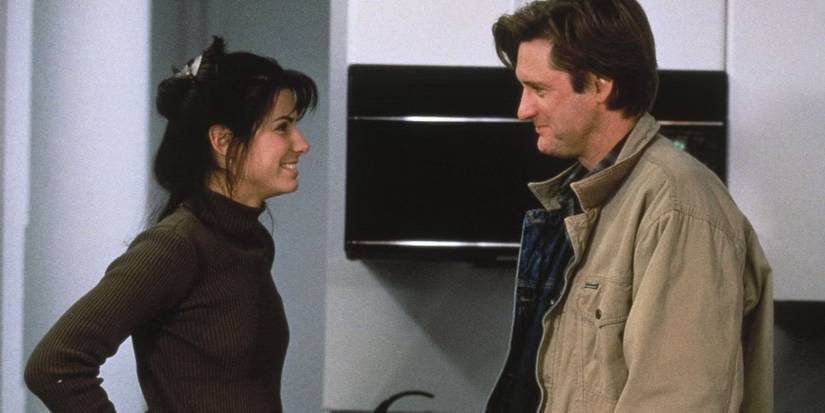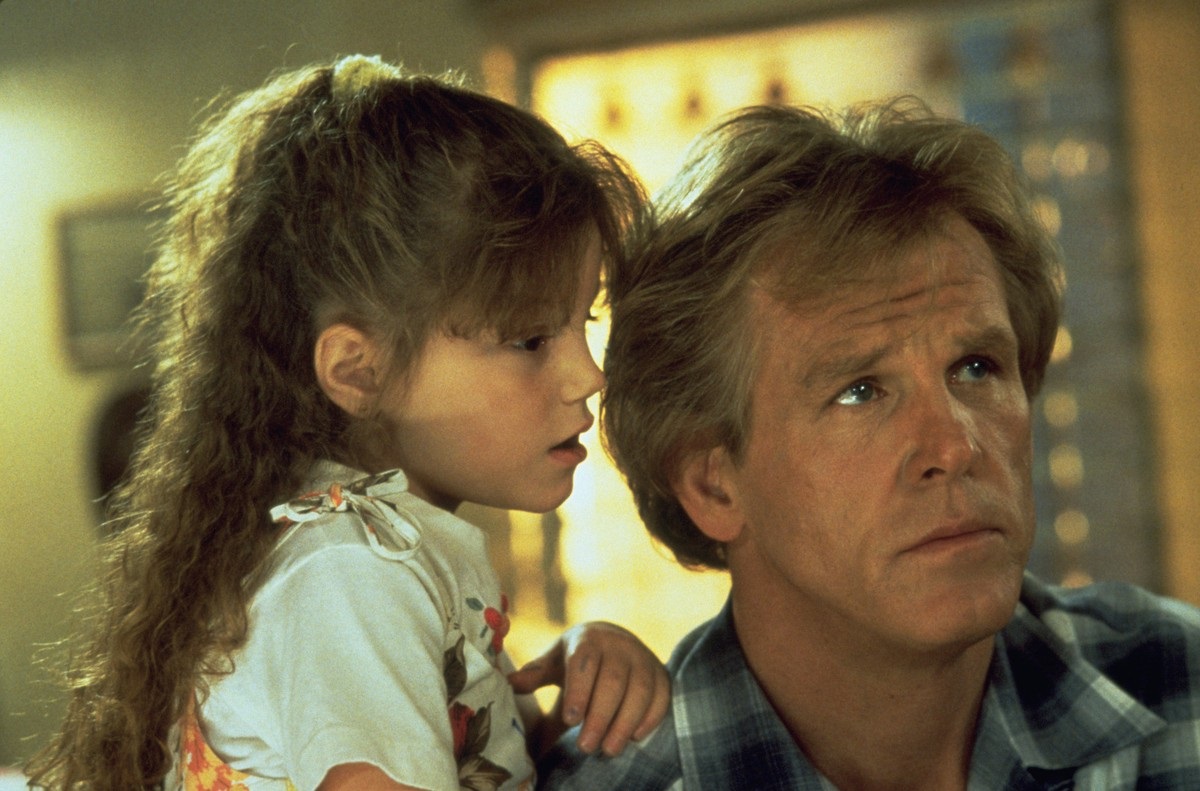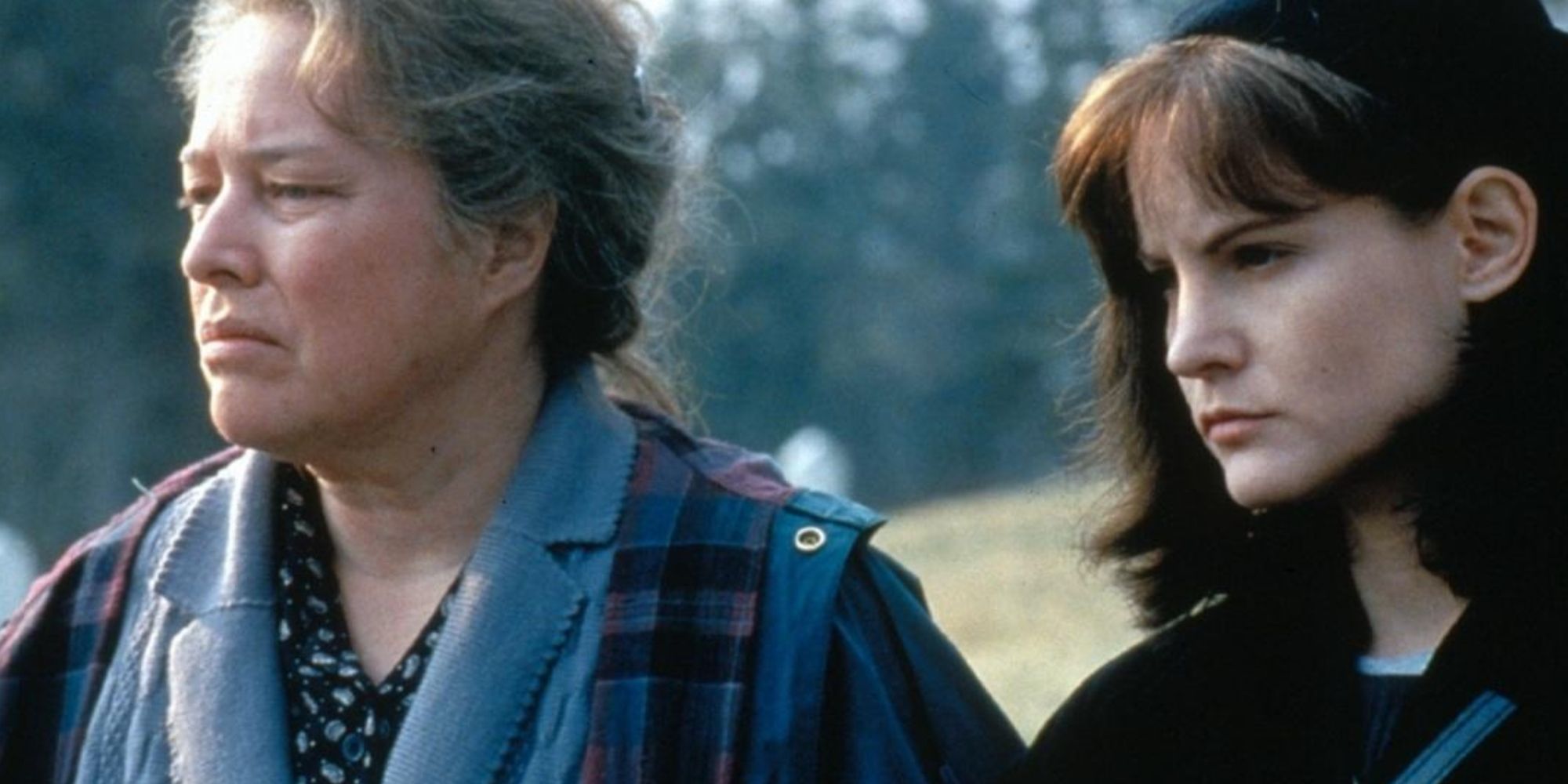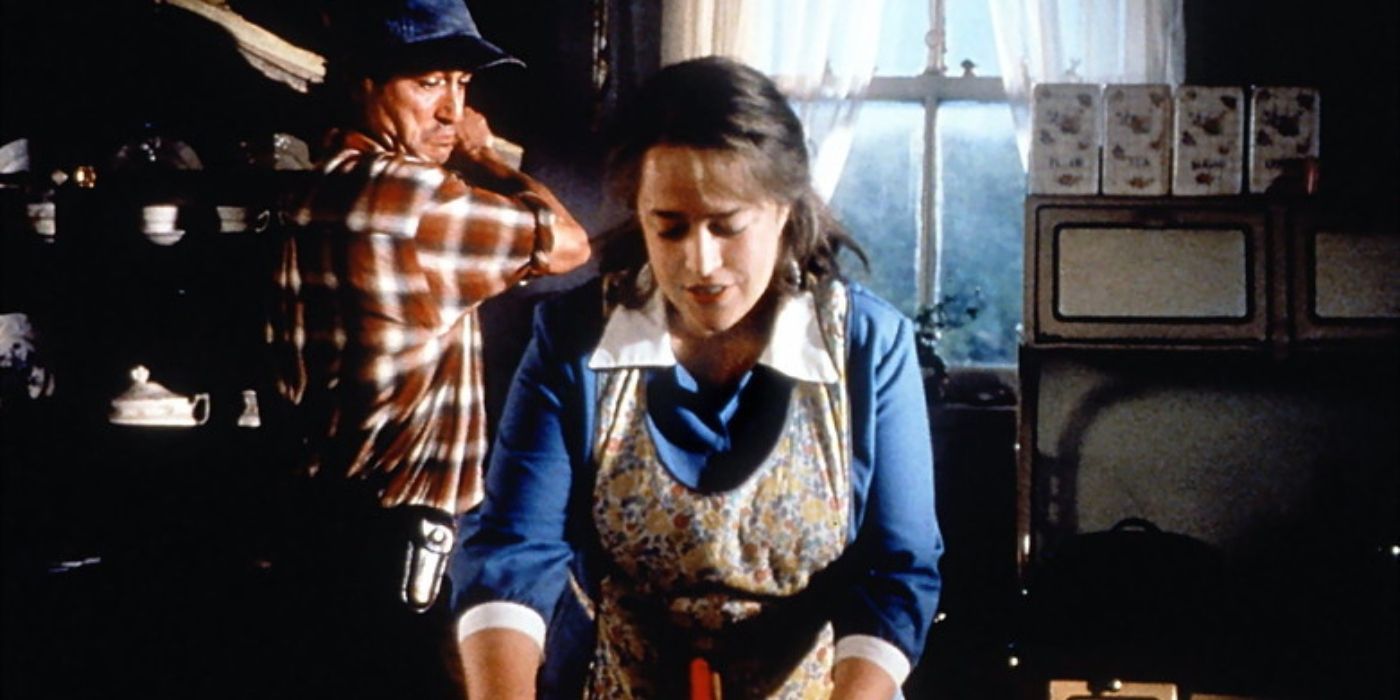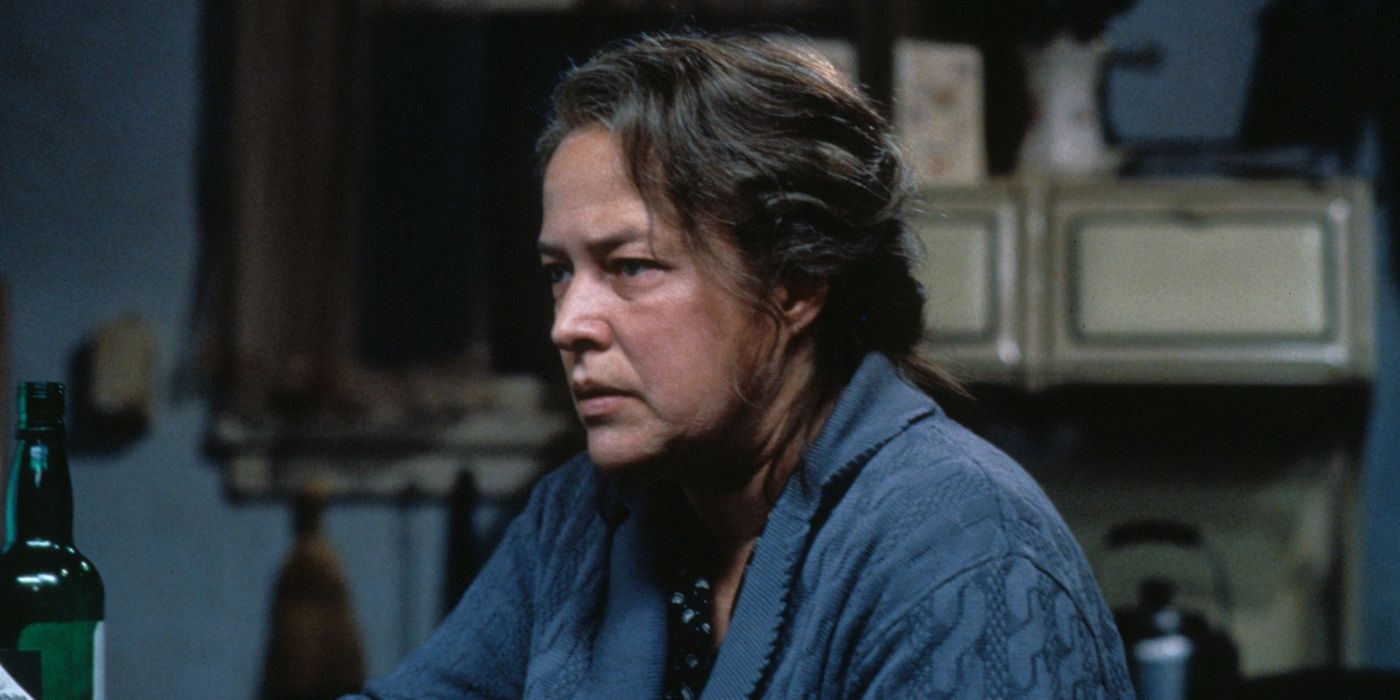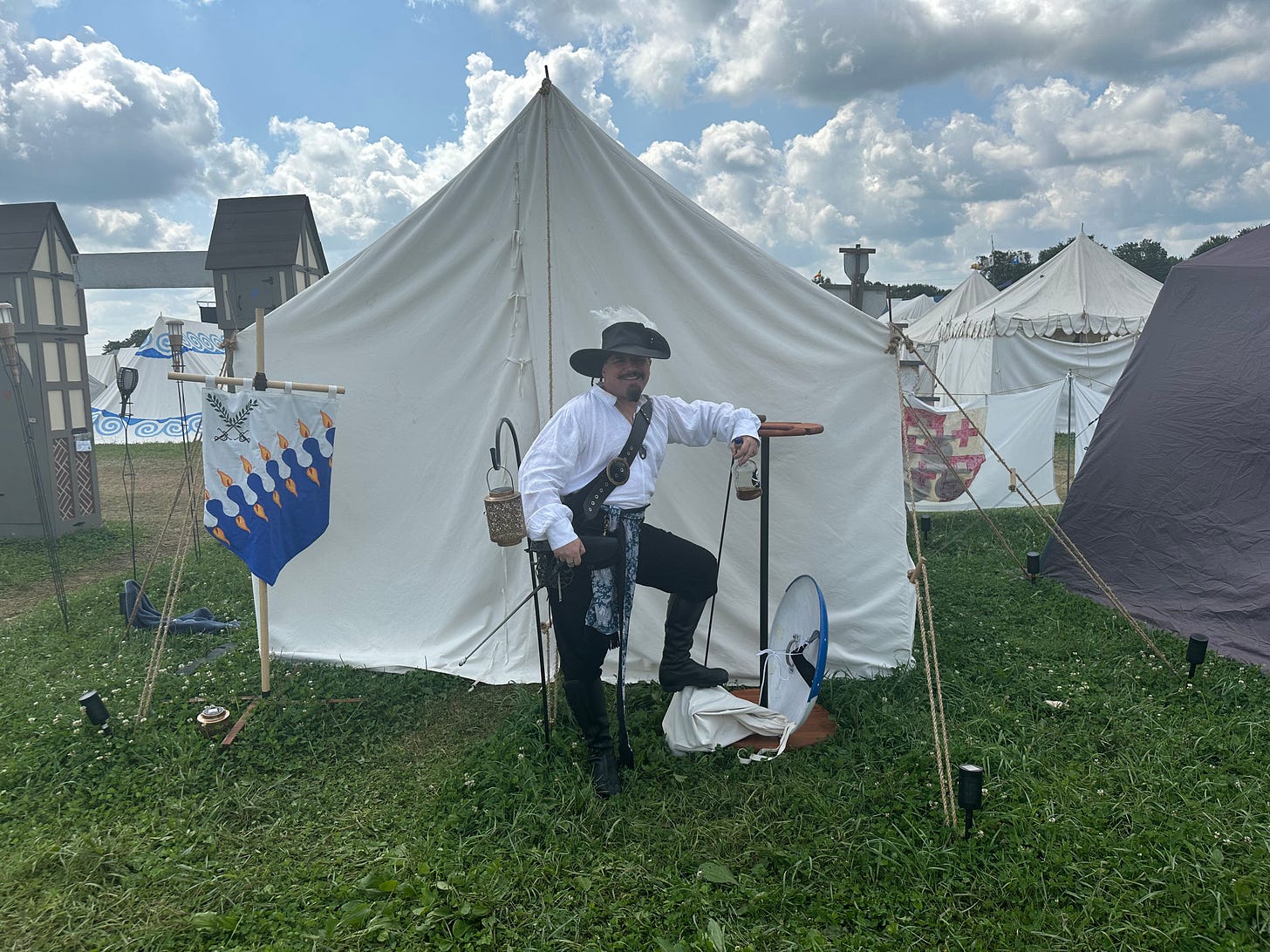[ad_1]
The Big Picture
- Kathy Bates delivers a masterful performance as Dolores Claiborne, a complex and tough character who has endured hardship and abuse.
- Dolores Claiborne is a story rooted in reality, not horror, showcasing Stephen King’s ability to write compelling narratives outside the supernatural genre.
- The novel has a feminist, female-centric air to it, highlighting the struggles and survival of women in a depressingly masculine world. Dolores Claiborne is a powerful and relatable character.
“They just cheated us. This isn’t fair. He didn’t get out of the cockadoodie car!” In 1990, Kathy Bates animated Annie Wilkes, one of the most iconic and troubling characters to erupt from Stephen King’s imagination. Whether she was telling her captive, Paul Sheldon (James Caan), about her obsessive love of his work or hobbling him so he can’t escape, Annie kept viewers on the edge of their seats wondering what lunacy she’d further devolve into. While Bates’ role as Annie Wilkes was a triumph, winning her the Academy Award, she starred as another complex woman in a film adapted from a Stephen King novel: the titular Dolores Claiborne.
Released in 1995, Bates’ role as Dolores in Dolores Claiborne doesn’t lend itself to the insanity of Annie Wilkes, but Dolores Claiborne has her secrets and provides a swath of complexity other than just being someone’s number-one fan. She’s a mother. She’s a widow. She’s an overworked maid. She’s an outcast. And she’s a suspect. King has a penchant for writing female characters that are just as tough as the Maine winters, and Dolores is no deviation. Dolores is no stranger to hardship, causing her to develop a calloused demeanor. But Dolores’ ruggedness won’t help her with the conundrum she’s facing. For that, she’ll need someone to step in and give her the help she’d usually reject, just like she needed once before.
What Is ‘Dolores Claiborne’ About?
We see a shadowy struggle. An old woman falls down or was pushed down the stairs. We see Dolores rushing down to meet the old woman who’s dying at the bottom of the staircase. But she’s not dead yet. Dolores ransacks the kitchen to find the perfect instrument and settles on a marble rolling pin. Just as she’s about to deliver a fatal blow, the door opens, and the mailman sees Dolores standing over the now-deceased miser Vera Donovan (Judy Parfitt).
In New York, a young journalist, Selena St.George (Jennifer Jason Leigh), is arguing with her editor about a story that she wants. But a fax comes into her office: Dolores Claiborne has been arrested for the suspected murder of Vera Donovan. This isn’t a story for Selena to report on; Dolores is her mother.
Resentfully, Selena goes to Maine to be with her mother while the investigation is pending. They aren’t close, so much so that when Selena arrives at the sheriff’s station Dolores thinks she’s a lawyer who’s been assigned to her case.
It’s clear that Dolores has become the town pariah; people sneer at her in public and her house is vandalized. But Dolores, ever a rock, doesn’t let the public resentment affect her. It’s Selena, with her drinking, smoking, and concoction of pills, that concerns her. Being back home torments Selena; there are so many things there she ran away from, so many things she’s swept from her memory.
There are flashbacks of earlier years. Dolores, young in a way that reveals just how harrowing the ensuing years would be on her, is a homemaker for her fisherman husband Joe St. George (David Strathairn). Selena is a young girl, enjoying a seemingly carefree adolescence. But things are far from perfect in the St. George house. Dolores falls victim to Joe’s verbal and physical abuse. Eventually, Dolores takes a job as a maid for the cruel and wealthy Vera Donovan, whose personal motto is “Sometimes, being a bitch is all a woman has to hang on to.” And that ethos is one that Vera practices daily.
An ego-bruised detective (Christopher Plummer) is determined to see Dolores changed for murder in Vera’s death, but he has his own motivations for wanting so. Big news travels quickly in a small town, and Dolores finds herself in the crosshairs where grudges, resentment, and reputation all come into play. Will Dolores be a free woman? Should she be a free woman?
‘Dolores Claiborne’ Is a Story Rooted in Reality, Not Horror
Perhaps what’s most misunderstood about Stephen King is that there’s the assumption that all of his work is scary. He has certainly earned a reputation for being the King of Horror. But great portions of his writing aren’t focused on gore and screams. Some of his work is political like The Dead Zone. Others, such as The Green Mile, involve supernatural elements but aren’t necessarily terrifying. Many who watch Dolores Claiborne would be surprised to learn that it’s a Stephen King novel. It has intense elements, but for many, it won’t match their ideas of what a King novel would look like. But like with many of his books, King puts much of himself into Dolores Claiborne. Though in New England, Maine is a drastically different state from, say, country club Connecticut. Mainers are tough people who endure brutal winters — many of King’s Mainers remain cold, even when the ice thaws. Dolores is of that ilk. Her hands crack from the blistering winter wind, her nose runs in the freezing temperatures, yet she toils away. From his writing and lifetime knowledge of Maine, King has most likely met several Doloreses — hopefully, no Annie Wilkeses, though. The demons of Dolores Claiborne are personal, not supernatural. He might be best known for books like Carrie and The Shining, but King proves that he doesn’t have to rely on the supernatural to write a good tale.
Bates, in a surprise to no one, is masterful in her portrayal of Dolores. And Dolores Claiborne has been one of her most overlooked performances. Kathy Bates, immensely talented, occupies a unique spot in the entertainment industry. She’s an actress that makes her roles believable, and believably fills them. Kathy Bates is someone you’d know; perhaps you went to school with a Kathy Bates, or knew a lady from your hometown who was a Kathy Bates. Kathy Bates is what happens when a regular person with ability breaks into Hollywood. The characters she brings to life feel like real people, not just Hollywood’s idea of real, regular people.
Bates’ Dolores is a tough woman whose life has been anything but easy. She loves her daughter, but her daughter hates her. She works for a nightmare of a boss and is paid below the poverty level. But she wasn’t always this hardened person. Bates is able to bring forth the duality of Dolores: the young mother who’s trying to keep a home together and protect her daughter and the middle-aged pariah who has to push through whatever comes in her path. When asked who has been her favorite character she has played, Bates answered Dolores Claiborne.
The Feminism of ‘Dolores Claiborne’
King credits his wife Tabitha as his most important advisor. All the books he writes go through the examination of his wife’s opinion. And while King’s understanding of life and people are elements of his books, Dolores Claiborne has a feminist, female-centric air to it that makes it apparent that his wife’s insights helped structure the novel. The novel at its core is about women having to survive men. That looks different for each woman. For Selena, it’s her editor who’s also a former lover who assigned her great stories when they were sleeping together, but puts her by the wayside when their nights together end. And her boss, as we discover, isn’t the only man to have used her. Before she became a widow, Vera’s husband was as cold and distant as she was to her staff. To Mr. Donovan, his wife was a waspy nuisance. But Vera is no one’s victim. Dolores not only had to survive her abusive late husband, but she also has to put up with the overzealous detective who’s operating on bitterness rather than professionalism. Dolores encounters an incident with her bank: money she was saving from her alcoholic husband still was swiped from under her by him. He tells a doubtful lie to the banker, who’s a man, of course, to procure her funds, and since he’s a man, he manages to acquire them. Dolores knows that if she, a woman, were to try to pull the same stunt her husband did, it’d never work. Her money is still, despite her best efforts, his money. But Dolores isn’t afraid to call out the innate sexism of the situation.
Vera says it best: “It’s a depressingly masculine world we live in.” Though flawed, Vera’s way of maintaining power, even if it is just over women who work for her, is through her relentless bitchery — “Sometimes, Dolores, sometimes, you have to be a high-riding bitch to survive. Sometimes being a bitch is all a woman has to hang on to.” But Vera, like Dolores, isn’t one to sit down and let men ruin them. “An accident, Dolores, can be an unhappy woman’s best friend.” In a Stephen King way, the women in Dolores Claiborne find their own solutions for troublesome men. Joe may think he lords over Dolores, but he, too, learns what a “high-riding bitch” she can be.
Dolores is also a special character in the King universe because she was inspired by his own mother; he dedicated the book to her. Even though Nellie Ruth Pillsbury King died years before Dolores Claiborne was written, he wanted to write a female character who embodied the same grit his mother had to exercise in her own life. King, whose father abandoned the family and left the responsibility of childrearing on his mother, had this to say about his mother and the many women like her, the Dolores Claibornes of the world, “After my father took off, my mother landed on her feet scrambling. My brother and I didn’t see a great deal of her over the next nine years. She worked at a succession of low-paying jobs…and somehow she kept things together, as women before her have done and as other women are doing even now as we speak.” King himself is somewhat of a Selena. Though he had a much better relationship with his mother than Selena had with hers, both he and Selena managed to make better lives for themselves because of their mother’s self-sacrificing hard work. Selena became a successful journalist, and King became the literary legend that he is. It was King’s mother who first encouraged his writing.
Dolores Claiborne is one of his rare novels that is told entirely in first-person by one character. The Body, otherwise known by its film name Stand by Me, also has a singular narrator. But King didn’t give space to have the Joes of the world share their perspective. Joe was what he was and his own rendition of events wouldn’t obfuscate the cruel reality he creates for Dolores. This is Dolores’ story. Dolores, like so many women in the world like her, including King’s late mother, is given the privilege few women in her position get to have: narrative. Dolores Claiborne is a story for and about women, especially the women who find themselves on the lower rungs of the socioeconomic order. For once, they don’t have to give something away. For once, the story is theirs to tell. They get to be the main character. Through Dolores, we see the stories of so many women who usually aren’t given the floor to tell them. Kathy Bates, in her best rough northeastern accent, brought to life one of King’s most relatable characters. Dolores Claiborne may not be telekinetic like Carrie, psychic like Johnny Smith, or have healing powers like John Coffey, but despite her having none of King’s supernatural endowments, she is, nonetheless, a powerful woman.
[ad_2]
Original Source Link





































